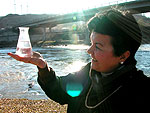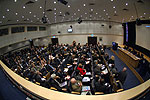From the event
NATO Security Science Forum
1. Opening remarks

NATO Assistant Secretary General for Public Diplomacy and Chairman of the Science for Peace and Security Committee, Mr. Jean-François Bureau, delivered the opening address at the forum. He acknowledged that the outcome of the forum would prove very useful to NATO Science for Peace and Security Committee in developing a road map for future projects. He underlined the increase in public awareness surrounding environmental issues, and highlighted that NATO defence and security policies have to take into account the environmental factor, making it as such a key component in military planning and efficiency.
He concluded that the environment relates to human security and is therefore of major importance for all NATO nations. In this respect, the SPS Programme provides not only the platform for dialogue but also the framework for cooperation in this field for NATO, Partner and Mediterranean Dialogue countries and he encouraged new proposals for cooperation in environmental security. He stressed the necessity for projects to deliver concrete benefits and results that will contribute to security in the Euro-Atlantic zone and beyond.
2. Global Security Concerns Relating to Environmental Issues

The first session addressed the current global environmental security concerns related to climate change, transboundary water issues, energy security, and management of natural catastrophes. The aim of the session was to identify global environmental security priorities and future challenges which could provide input for cooperative projects within the framework of the SPS Programme.
Climate Change
Professor Martin Parry from the Intergovernmental Panel on Climate Change Working Group II opened the first session on global security concerns relating to environmental issues. Global climate change, which affects water resources, access to food supplies, flooding of coastal areas, and increases disease and mortality, will enhance the risk of conflict, leading to environmental migration and ultimately regional and global instability. Some impacts of global climate change are occurring now and some future impacts are unavoidable. Early action on mitigation is needed to avoid or reduce even further impacts, otherwise climate change could exceed our capacity to adapt; therefore both adaptation and mitigation are needed now to ensure continued secure access to essential resources.
Water Security Issues
Dr. Andras Szollosi-Nagy, Deputy Assistant Director for Natural Sciences at UNESCO quickened the pace of discussion on global security concerns with an in-depth look at water security issues, in particular transboundary water concerns. Shared water basins and the growing number of the population in these areas could cause political tensions resulting in conflict or even the potential of a war over water. Raising the importance of water on the political agenda is a challenge facing us all, and equally important is the ability to use cooperation on watershed as an effective tool for building peace and stability.
Energy Security
Dr. Mustafa Tiris from Tubitak Energy Institute in Turkey gave an overview of Energy Security. There is a need for more international collaboration regarding developing technologies through R&D to promote sustainable energy by developing innovative systems and services and focusing on renewable and efficient energy systems. He called for in the short-term, more investment for oil and gas industries; in the mid-term, a focus on nuclear energy and clean coal; and in the long term, efforts to exploit renewable energy sources.
Management of Natural Catastrophes
Professor Andrey B. Shmakin from the Institute of Geography in Russia closed the first session with a presentation on Natural Catastrophes in the Global Change Epoch. Global change is a multi-sided issue of natural versus anthropogenic factors. There is a complicated interaction between climate change and desertification. Climate change brings warmer winters and more frequent extreme weather conditions. He cited the summer of 2007 which bore witness to severe floods in the UK and immensely destructive forest fires in the Mediterranean. An example of a catastrophic anthropogenic factor occurred in the Black Sea where the entire food chain was attacked and fish supplies diminished by 12-fold in 5-7 years due to an unusual species of jellyfish which arrived in ballast waters from North America.
Proposals were made for collaboration with NATO SPS on a number of projects in ecological security, including analysis of hydrological anomalies and consequences of collapse of hydrotechnical constructions due to terrorist activities, and geographical analysis of natural hazards and disasters for mitigation purposes.
3. Role of International Organizations in Addressing the Environment and Security

The second session focused on the role of international organizations in addressing the environment and security. The session also covered two NATO Science for Peace (SfP) Projects to illustrate activities of NATO in cooperation with other international organizations. The main aim of the session was to identify the areas of mutual interest in the environmental security field for possible future cooperation.
Environment and Security (ENVSEC) Initiative1 (represented by the Regional Environment Centre (REC) and Organization for Security and Cooperation in Europe (OSCE)
Ms. Marta Bonifert, Director of the REC, highlighted the important role of NATO SPS Programme in the ENVSEC initiative: 25 projects had been initiated with the support of NATO; 6 already finalized and 19 still on-going. She stressed that cross border cooperation is an essential component that can contribute to environmental peace and looked forward to the discussions within the EU on climate change as a serious risk to security. In that respect the ENVSEC Initiative can serve as a model for cooperation not only in the regions where it is active but also for others considered to be of high environmental security risk.
Dr. Bernard Snoy, Co-ordinator of OSCE Economic and Environmental Activities, stated that since 1975 the OSCE has made reference to the role of the environment in reinforcing peace and security in Europe. More recently at the Madrid Declaration at the end of 2007 all 56 countries of the OSCE committed to “reduce environment-related security risks among each other and with other international and regional institutions and organizations working in the area of the environment.” The Declaration singled out the following environment-related security risks: land degradation, soil contamination, desertification and water management. Dr. Snoy gave examples of current OSCE activities under ENVSEC including the joint NATO/OSCE project on South Caucasus River Monitoring (more information is available at www.nato.int/science), and a joint NATO/OSCE workshop in Spain on Water Scarcity, Land Degradation and Desertification in the Mediterranean Region.
Dr. Snoy concluded that more attention will be given to environmental security issues with more links to the economy, the environment and security. Both hard decisions and fast action are required by all players to ensure the sustainability of the planet’s resources with equal access for all. Not to do so would jeopardize the security of future generations.
European Environment Agency (EEA)
Mr. Robert Lawson from the European Environment Agency (EEA) explained the role of the EEA in managing the delivery of environmental information. The EEA provides tools for data flow for a seamless provision to organizations and institutions and to the general public. Providing the information tools that the EU needs include a shared environmental system with common standards and collectable data. The amount of data available is increasing and needs to be made available to the end users in real time. Mr. Lawson also covered the issue of new technologies such as smart sensors, and how they deliver effective networking and transmission of information. An EEA study on environmental issues provided some key conclusions that patterns of production and consumption (responding to our needs) are drivers of degradation which can in turn drive conflict resulting from migration and instability due to for example air pollution, water contamination, etc. He concluded by highlighting the key importance of networks and partnerships to deal with the issues surrounding the environment and security.
NATO SfP Project on Radioactive Contamination in the Central Asia in cooperation with ENVSEC, International Atomic Energy Agency (IAEA) and International Science and Technology Centre (ISTC)
NATO’s active role in cooperating with other international organizations was presented by Dr. Peter Stegnar, who exposed the problem of the legacy of 50 years of uranium exploitation in the former-Soviet Republics of Kazakhstan, Tajikistan, Uzbekistan and Kyrgyzstan. This project is part of the ENVSEC Initiative supported by the NATO SPS programme and has as its major objective to determine the levels of contamination in these republics. Since the start of the project in 2006 they have achieved success with field missions with their local counterparts in the four countries. They have benefited from upgrading of their equipment and young scientists have received training in the latest methods and techniques. Preliminary dose assessments have been made and the results show that in general radioactivity level is acceptable; however they have to deal with the perceived risk by the population versus the actual risk. Radio phobia is high due to the bad economic situation where the average wage is 5 dollars per day. The speaker concluded by recommending that the specific radiological situation be addressed adequately to mitigate the situation and protect groups of people who may be exposed.
For more information on this project http://www.nato.int/issues/science-environmental-security/projects/5/index.html
NATO SfP Project on Transboundary Water Management in the Caucasus in cooperation with OSCE
Dr. Saghatelyan from the Centre for Ecological-Noosphere Studies in Armenia explained that transboundary water management of the rivers Kura and Araks is a major factor contributing to peace and security in the region. There is a need to initiate dialogue and this NATO/OSCE project can serve as a module, also demonstrating collaboration between local scientists and training of young scientists. In 2002 at the beginning of the project there was no credible data available on the water quality; in 2008 there are monthly expeditions for sampling which have identified heavy metals, POPs and radionuclides in the water. Dr. Saghatelyan made a proposal for a new project entitled Pollutant Fate and Transport in the Surface Water of the Kura-Araks Watershed for consideration by the SPS Committee.
Dr. Musulumov from the Ministry of Ecology and Natural Resources in Azerbaijan presented the Azeri viewpoint on shared water resources of the Kura River which is the main source of fresh water for Azerbaijan. To resolve and mitigate this situation the countries concerned have to join together to improve the environmental situation for the people dependent on this resource.
4. Partner Country Priorities for the NATO SPS Programme

The third session included presentations by experts from Partner countries on ongoing NATO projects, highlighting their nation’s priorities with an assessment of the added value of the NATO SPS Programme. A presentation on Desertification and Security Aspects was also given to draw attention to the one of key priorities of the Mediterranean Dialogue nations for cooperation within the NATO SPS Programme.
NATO SfP Project - Balkan Harmonisation of Seismic Hazard Maps
As highlighted by Professor Glavatovic from the Montenegro Seismological Observatory, seismic hazards are a high risk in the Balkans region and a reliable assessment is essential to ensure reduction of loss of human life, property damage and socio-economic disruption. Experts from eight NATO and Partner countries are fully committed to the introduction of state-of-the-art seismic hazard methodology and new maps for the region (in accordance with EUROCODE 8). Professor Glavatovic reported on the progress achieved so far including the training of young scientists. The project is an excellent example of a regional cooperation with 6 Balkan countries and 2 NATO countries, the result of which will be for the common benefit of the population in the entire western Balkans region.
For more information on this project http://www.nato.int/issues/science-environmental-security/projects/9/index.html
NATO SfP Project - Mediterranean Dialogue: Gulf of Aqaba Projects
Dr. Al-Zibdah from the Marine Science Station in Jordan highlighted that, in the Gulf of Aqaba, NATO SPS is now the major organization supporting four projects with a focus on the environment, socio-economic factors and food security. These projects are being conducted among experts from Turkey, the United States, Germany, Israel and Jordan. Jordan has good relations with other Mediterranean Dialogue countries in the region and there is the potential for Jordan to play a role in encouraging cooperation through scientific research projects. The main priorities of these projects are to achieve peace, combat poverty, diversify income resources and foster regional collaboration and international support.
Looking to the future, there could be more of a focus on socio-economic resources, monitoring, outreach and transparency and effects of land based activities and ballast water on the Red Sea.
Desertification and the Link to Security
Professor Safriel from the University of Jerusalem, Israel, presented desertification and the link to security. Desertification occurs mostly in dry lands and is a result of man-made activities. 35% of the world’s population currently lives on dry lands and it experiences the highest population growth leading to the lowest GDP, highest infant mortality rates and highest poverty. He continued that poverty and security are interlinked and that poverty is a driver of desertification. Professor Safriel highlighted alternative livelihoods for people living in dry lands including options such as solar energy (sustainable in the hyper arid lands) and fish cultivation. He stressed the need for investments and good governance in order for these alternative livelihoods to succeed.
5. Horizon Scanning Exercise on Environmental Security Issues

The fourth session included a horizon-scanning exercise on potential environmental security issues and the link between defence and environmental security.
Environmental Security and Defence Analysis Perspective
Dr. Chris King from the US Army Command and General Staff College, USA, addressed the issue of how environmental security should be a part of the strategic defence planning process through a strategic analytical approach. He noted that there cannot be peace and stability without a sustainable environment, leading to the conclusion therefore that environmental security is a component of defence. Environmental security is the common ground which explains the mutual interests of security and the environment. He discussed the environmental parameters between security and stability – such as water as a scare resource, air quality, land use, deforestation. Through his analytical findings he is able to associate environmental degradation with failed states with up to 98% accuracy. His model can be used to illustrate what is happening today and is able to predict where problems might lie in the future.
He used Afghanistan as a case study where the statistics on availability of safe drinking water, sanitation, management of solid waste, loss of arable lands, and air quality indicate an extremely high environmental security risk. Dr. King concluded that defence and security is a much larger issue than wielding military power and that environmental security analysis can provide a powerful tool in defence planning to contribute to reducing and mitigating future threats.
Future Security Environment (FSE) Study by NATO Allied Command Transformation (ACT)
Lt.Col. Tohmas Brevick from NATO ACT presented the key findings of a study that was undertaken to provide information to NATO Transformation and support defence planners. The report provides a strategic overview looking at overall concerns, geopolitical changes including countries of concern, global security risks such as extremism and terrorism, and cyber war. The key findings reveal that terrorism and the spread of weapons of mass destruction will be the principal threats to the Alliance within the timeframe to 2025. Criminal organizations will expand activities and China, India and Russia will be major players in the future security environment. North Korea, Iran and Syria will continue to be of concern and energy security will also be a concern for NATO. Mr. Brevick observed that climate change will affect future global environment – threatening water and food production on vast areas of the world. Energy will be the key driver of the future global economy and a driver of transformation from oil to new sustainable forms. Future challenges will be the widespread effect of terrorism and globalization calls for greater effectiveness by nation states, governments and the public sector.
Integral Monitoring as a Tool for Environmental Security
Professor Viktorov, Deputy Director for the Geo-ecology Institute of Russian Academy of Sciences presented Integral Monitoring as a tool for environment security. He explained the need for a constant flow of information on the environment through a monitoring system that deals with environmental data acquisition and its application. Effective environmental monitoring systems are key to ensuring environmental safety. Monitoring must be integrated and comprehensive and control different natural components such as air, vegetation, hazardous geological processes and others.
Maritime Security
Finally, Professor Silvia Ciotti from the EuroCrime Research Centre in Italy addressed two main threats to maritime security – piracy and maritime terrorism. Acts of piracy involve illegal acts of violence for private ends directed on the high seas. Maritime terrorism or maritime attacks are not so frequent in number when compared to terrorist attacks in general; however the situation is changing quickly and becoming ever more risky as the number of targets is increasing – cargo and passenger ships, ports, oil platforms, raw materials and dangerous products that come across seas every day and travelling in dangerous areas. Professor Ciotti proposed some ideas for remediation including controls and barriers to protect ports; physical obstacles in reaching sea platforms; better training for crews and response teams; psychological support for crews who have been under attack. She concluded that piracy and maritime terrorism are emerging threats that we simply cannot ignore and many issues are still underestimated in this area.
6. Conclusions by the Moderators

From the presentations given it is clear that environmental degradation is a driver for unrest in the world. Securing the environment is paramount to maintaining peace and stability. The NATO SPS Programme can continue to act as a platform to bring people together to work on the problems and to find solutions in NATO, Partner and Mediterranean Dialogue nations.
This Forum has demonstrated that scientists and military personnel have a common vision in areas relating to environmental security. This is a positive message that demonstrates that more collaboration could be made to resolve the most important and critical environmental problems.
The participants urged the NATO SPS Programme to be more proactive in order to get the benefits of these activities undertaken right down to end-users where it really matters.
The Forum highlighted that there is a lot of shared activity by different international organizations and that this cooperation should continue into the future. In addition there was a request for the SPS Committee to revisit the SPS key priority areas with a view to defining topics for future focus.
NATO SPS Programme is making a large effort to share information and to launch joint activities on a case by case basis both with other NATO Divisions and Agencies and other International Organisations. A perfect example of such collaboration is the ENVSEC initiative which identifies environmental security risks in different geographical areas (Central Asia, Caucasus, Belarus, Moldova and Ukraine). The participants in the Forum generally agreed that there could still be more concerted effort in addressing environmental security.
Public Diplomacy has an important role to take the end results to the public; therefore there is a need to develop a solid SPS communications strategy plan, to reach out to the general public, explaining the activities and how the results impact on human security. More effort is required in terms of civil-military cooperation with colleagues in the NATO International Military Staff (IMS) and in building synergies with other NATO staff.
- The ENVSEC Initiative was established in 2003. Partners are: the United Nations Environment Programme (UNEP); the United Nations Development Programme (UNDP); the Organization for Security and Co-operation in Europe (OSCE); NATO; the United Nations Economic Commission for Europe (UNECE); the Regional Environment Center for Central and Eastern Europe (REC).